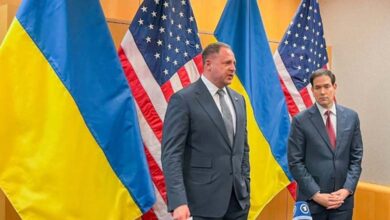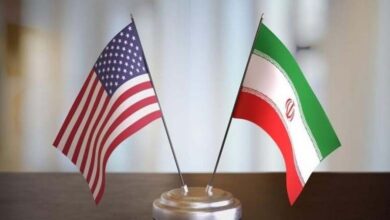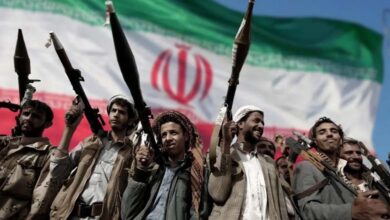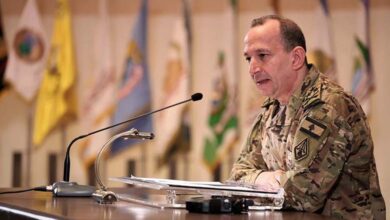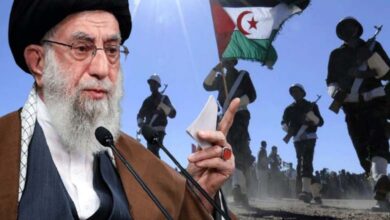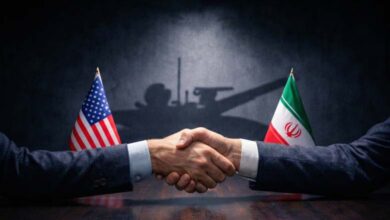Trump Ends Sanctions on Syria as Israel Signals Interest in Normalization
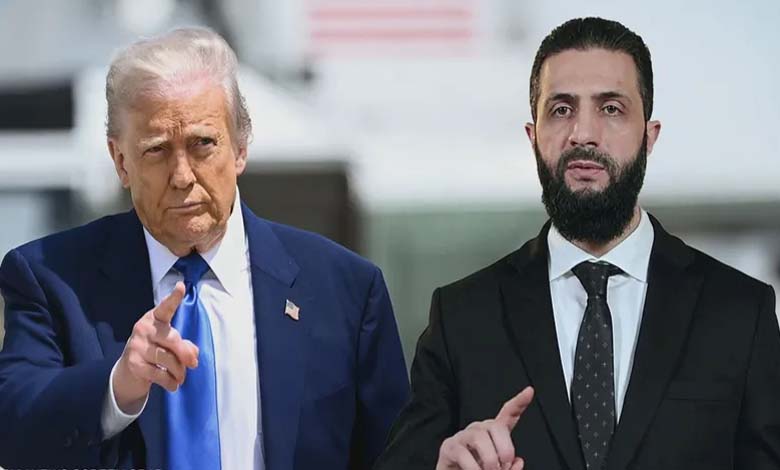
Trump’s move opens the door to unprecedented financial and trade openness, despite Syria remaining on the U.S. list of “state sponsors of terrorism” and ongoing internal security challenges.
-
U.S. Troop Reduction in Syria Puts SDF in Disarray
-
Where Are Syria’s Muslim Brotherhood Headed? And What Is al-Sharaa’s Position Toward the Group?
U.S. President Donald Trump officially lifted sanctions on Syria on Monday, aiming to reintegrate the war-torn country into the global economy, while Israel expressed interest in normalizing ties with Damascus—a move Syria quickly hailed as a “historic decision.”
Trump had announced in May his plan to lift most sanctions in response to appeals from Saudi Arabia and Turkey, following the dissolution of an armed coalition led by Hayat Tahrir al-Sham, formerly al-Qaeda’s affiliate, effectively ending five decades of Assad family rule.
On Monday, Trump signed an executive order ending the “national emergency” regarding Syria, in place since 2004, which had enabled sweeping sanctions on state-run institutions, including the central bank.
-
The Black Ghosts Strike: Is Russia Returning to Guerrilla Warfare Through Syria?
-
Between Breaking Isolation and Renewing It: What Does the Lifting of Sanctions on Syria Really Mean? Experts Weigh In
White House spokesperson Karoline Leavitt said the order was part of efforts to “support Syria’s path toward stability and peace.”
Brad Smith, the Treasury Department’s sanctions official, stated that this step “will end the country’s isolation from the global financial system, facilitate international trade, and encourage investment from both regional neighbors and the U.S.”
The order noted that Syria has “changed” since Assad’s fall, citing “positive actions taken by the new Syrian government under President Ahmed Sharraa.”
-
Will Trump and Al-Sharaa Meet in Saudi Arabia? British Newspaper Reveals the Details
-
Ahmed Al-Sharaa Woos Trump: Peace with Israel in Exchange for Lifting the Siege
The Syrian government welcomed the move. Foreign Minister Assad al-Shaibani posted on X: “We welcome the lifting of the majority of sanctions on the Syrian Arab Republic, under the historic executive order by President Trump.”
He called it a “turning point that will help push Syria into a new era of prosperity, stability, and international engagement.”
The minister added that “removing this major obstacle to economic recovery opens the door to long-awaited reconstruction and development, and the restoration of critical infrastructure, creating the right conditions for the dignified and safe return of Syrian displaced persons.”
-
Ankara Places High Hopes on the Trump Administration to Improve Relations
-
Security Classification and Travel Restrictions: The U.S. Rewrites Its Global Relations
The U.S. maintained sanctions on members of the former government, including ex-President Bashar al-Assad, who fled to Russia late last year.
Syria recently completed its first electronic financial transfer through the international banking system since the outbreak of civil war in 2011.
The sanctions’ lifting coincides with a notable shift in Israel’s stance, as the country shows interest in normalization with Damascus and Beirut.
This timing reflects a new regional dynamic, driven by Iran’s waning influence in Syria and Lebanon—largely due to repeated Israeli strikes.
-
The U.S. Administration and Syria: Caution and Skepticism Towards the New Regime Led by Ahmad Al-Sharaa
-
Trump Reinstates Cuba on ‘Terrorism Sponsors’ List… Cuban President Responds
Trump officials believe lifting the sanctions will better integrate Syria into the region and support Israeli diplomatic efforts.
Tom Barrack, U.S. ambassador to Turkey and Trump’s envoy to Syria, said Israeli strikes on Iran in June created “a window that never existed before.”
“It’s an opportunity we’ve never seen, and the president has assembled a team capable of seizing it,” he told reporters.
This development paves the way for realignment of regional alliances, with Israel now considering normalized ties with its northern neighbor after years of hostility and military action.
-
Erdogan gives Syrian Kurds the choice between laying down arms or death
-
Trump Accuses, Turkey Denies Seizing Power in Syria
The sanctions’ removal is expected to enhance Syria’s regional integration, aligning with Israel’s goal of diminishing Iranian influence near its borders.
Though initially skeptical of Syria’s post-Assad trajectory, Israel has reconsidered after Ahmed Sharraa’s rise and his government’s subsequent reforms.
Despite this hopeful shift, major challenges remain. Syria has seen attacks on minorities since Assad’s fall.
At least 25 people were killed and dozens injured in a suspected Islamic State attack on a church in Damascus on June 22.
-
Ukraine and Lebanon: Two Separate Wars That Changed Syria’s Fate
-
The Telegraph: Trump’s Ban on the Muslim Brotherhood Is a Once-in-a-Generation Opportunity
Before Trump’s unexpected announcement during his Saudi visit, the U.S. insisted on progress in areas like minority protection.
Syria remains designated as a “state sponsor of terrorism,” a status that may take longer to lift and still discourages large-scale investment.
However, U.S. Secretary of State Marco Rubio said Monday that this classification may soon be reassessed.
“I will reconsider the designation of Hayat Tahrir al-Sham and President Sharraa as Specially Designated Global Terrorists, as well as Syria’s status as a state sponsor of terrorism,” he said.
-
Erdogan Urges Trump to Halt Arming Israel to End the Gaza War
-
“AK-47”: The “Legendary” Soviet Weapon Present in the Attempted Assassination of Trump
Lifting the sanctions marks a turning point for Syria’s long-struggling economy. The decision opens doors to foreign trade and access to essential goods, potentially easing import costs and reducing consumer prices.
More importantly, it reconnects Syria’s banking sector to the global financial system, facilitating transfers and helping stabilize the battered Syrian pound—a financial “lifeline” for an exhausted economy.
Beyond immediate effects, this could attract foreign investment essential for rebuilding Syria’s war-ravaged infrastructure, with losses estimated in the hundreds of billions of dollars.
-
Saudi Arabia does not rule out Syria’s return to the Arab League
-
Syria – Latest violations by Turkey-backed militias in Afrin
It may also revitalize the weakened energy sector, offering opportunities in extraction, refining, and transport.
Still, recovery depends on major reforms to improve transparency and attract capital. Remaining sanctions—such as the terrorism designation—may continue to deter major investors.
There is hope, however, that this move signals the beginning of a new era of growth and stability—if paired with serious domestic reforms and a welcoming investment climate.


